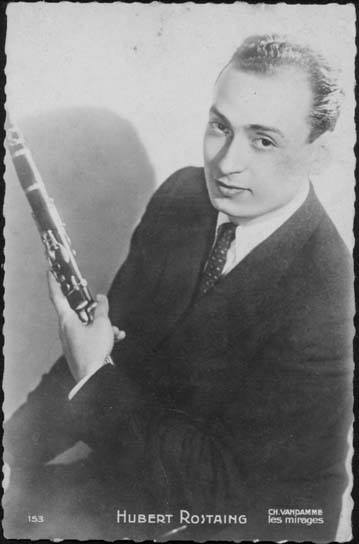
Hubert Rostaing
Instrument: Clarinetist
Who is Hubert Rostaing?
Hubert Rostaing (1918–1990) was a talented clarinetist and tenor saxophonist who made significant contributions to the world of jazz and music in general. Born in 1918, Rostaing began his musical journey in Algiers, where he formed his first band called the “Red Hotters.” However, it was in Paris that his career truly blossomed.
After relocating to Paris, Rostaing had the remarkable opportunity to collaborate with the legendary Django Reinhardt and his quintet. He showcased his skills on both clarinet and saxophone while performing alongside Reinhardt. One of his most notable performances was on the track “Nuages,” which is widely regarded as one of his finest moments with Django. Rostaing’s contribution to the piece further solidified his position in the band. However, in 1962, he made the decision to leave the quintet to focus on composing for films and exploring classical music.
Rostaing’s talent as an orchestrator and arranger found a new outlet in the world of French cinema. Over the course of his career, he worked on more than twenty French films, lending his expertise to create captivating and evocative musical compositions. His contributions to the world of film music showcased his versatility and artistic range.
In 1939, Rostaing arrived in Europe and had the opportunity to join the quintet of the Hot Club de France, thanks to the support of Alix Combelle. This invitation came about as a result of Stéphane Grappelli’s detainment in England during the Second World War. Rostaing’s inclusion in the group allowed him to work alongside Django Reinhardt and record notable tracks such as the immensely popular “Nuage” and other remarkable recordings. Additionally, he performed with various ensembles and orchestras in Paris, including Jimmy’s bar orchestra and Raymond Legrand’s orchestra, where he showcased his musical prowess.
Throughout his career, Rostaing took on various roles and engagements that highlighted his versatility. In 1951 and 1952, he served as the director of the Moulin Rouge orchestra, displaying his leadership and conducting abilities. In 1957, Rostaing had the honor of accompanying the renowned American singer Nat King Cole during their performance at the Palais de Chaillot. The same year, he conducted the orchestra at the Alhambra, a prestigious Parisian venue that hosted notable artists such as Maurice Chevalier.
During the late 1950s, Rostaing engaged in smaller gigs alongside fellow musicians like Bob Castella and had the opportunity to collaborate with the acclaimed singer Yves Montand. Notably, he also recorded under the pseudonym Earl Cadillac, further exploring his artistic range and pushing boundaries.
Hubert Rostaing’s contributions to jazz and music as a whole were significant. His performances with Django Reinhardt, his work as a film composer, and his various engagements in orchestras and ensembles showcased his immense talent, adaptability, and creativity. Despite his passing in 1990, his legacy as a versatile musician and accomplished clarinetist and saxophonist lives on.